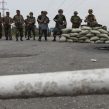
Kyrgyz Officials Poised to Reject OSCE Forces
Publication: Eurasia Daily Monitor Volume: 7 Issue: 158
By:

Kyrgyzstan’s top officials are against the deployment of Organization for Security and Cooperation in Europe’s (OSCE) 52-member Police Advisory Group. The OSCE can still “gracefully” cancel its decision to send the group to Kyrgyzstan, said Security Council Secretary Alik Orozov (www.akipress.kg, August 11).
“The situation in Kyrgyzstan is quite different from the situation in Kosovo or South Ossetia. Kyrgyz and Uzbeks have lived together for centuries and were able to suppress conflict and this is the people’s achievement, not that of security structures,” Orozov argued. Although his words resonate with some political moments’ earlier statements, he is the first security official to openly oppose the OSCE police mission.
When the OSCE decision to deploy a police group was first announced last month, senior security officials showed open support for such foreign assistance. Interior Minister, Kubatbek Baibolov, has said that the OSCE is welcome in Kyrgyzstan; it is the only international force that has responded to the country’s plea for help. Indeed, the OSCE’s goal is to “facilitate strengthening trust, stability and order in the country,” by helping local police monitor the post-conflict situation (https://www.osce.org/cio/item_1_45438.html).
Citing popular discontent with the OSCE’s potential mission in Kyrgyzstan, most politicians planning to run in the October 10 parliamentary elections argue against the OSCE’s presence. Temir Sariyev, former member of the government and head of the Ak Shumkar party, has said that the government must consider widespread popular opposition to OSCE sentiments (www.akipress.kg, August 11). Sariyev specifically highlighted the local population in southern Kyrgyzstan, where rallies against the OSCE forces have been staged in recent weeks.
Like Felix Kulov, former KGB general and currently the head of the Ar-Namys party, Sariyev argues that policemen will be unarmed and therefore of limited use. According to this view, Kyrgyz forces will have to guard foreign policemen instead of carrying out their own duties. OSCE policemen are likely to form one-sided conclusions, according to one government senior official, Azimbek Beknazarov. Beknazarov argues that the OSCE’s help is too little and too late as the situation in southern Kyrgyzstan seems to have settled.
Senior political officials’ opposed to the OSCE shape the perceptions of lower ranking police and military personnel. Some police personnel have openly told Jamestown that although the OSCE assistance is “interesting,” it is out of context. “We are still using pen and paper to communicate between oblasts, they [international community] would be better to supply us with computers, than teaching human rights,” said one policeman. Furthermore, facing strong international criticism for handling the violence in June, Kyrgyz police forces seem to oppose the presence of external observers.
Increasing objection towards the OSCE Police Advisory Group will spill over into the way Kyrgyz political leaders treat the findings of the international investigation. Vice-chair of the OSCE Parliamentary Assembly, Kimmo Kiljunen, will lead the investigation starting this month. Although the investigation is not backed by the OSCE, politicians might choose to reject its findings.
Partly as a response to domestic pressure, the government has formed a national commission to investigate the June 11-14 violence in southern Kyrgyzstan. Mostly local NGO groups will conduct the investigation in coordination with the president’s administration (www.24.kg, August 11).
As Ramadan has commenced in Kyrgyzstan, tensions are likely to abate across the country. However, more experts are convinced now that elections will create tensions among competing parties, particularly those not able to reach the 5 percent threshold nationwide or the 0.5 percent threshold in each electoral district.
Over fifteen political parties have, to date, declared their interest to run in the elections. Experts predict that only one third will be able to reach both thresholds. Ata Meken, Social Democratic Party, and Ata Jurt are the frontrunners, while other major parties such as Ar-Namys and the Communist Party might be unable to secure even a half percentage point in every electoral district. Furthermore, the mechanisms for allocating parliamentary seats based on the election results remain unclear (Carnegie Center discussion, August 11). This will increase confrontation among political forces in the aftermath of elections.
According to internet polls conducted by Akipress, none of the political parties will be able to gain a majority in parliament, and if the elections were held today, it would take at least three parties to form a parliamentary majority (August 11). Once the parliament is elected, the current OSCE opponents will be able vote against the international mission.
The foreign ministry will make the final decision on whether the OSCE mission should be allowed to arrive in Kyrgyzstan. Faced with growing opposition from senior government officials, however, the ministry might succumb to mounting pressure.




